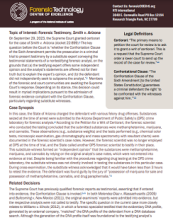State Supreme Courts
Victim Impact Statements: Their Effects on Court Outcomes and Victim Satisfaction
Managing the Criminal Appeals Process: Three Alternative Approaches
UNIFIED COURT SYSTEMS - A RANKING OF THE STATES
Neuropsychology, Neuroscience, Volitional Impairment and Sexually Violent Predators: A Review of the Literature and the Law and Their Application to Civil Commitment Proceedings
The Over-citation of Daubert in Forensic Anthropology
Topic of Interest: Forensic Testimony, Smith v. Arizona
A multilevel analysis of juvenile life without parole and its reform: understanding the people, places, and politics that shape policy.
Gideon at 60
Summarizing A Snapshot of State Public Defense Systems and Paths to System Reform
Meeting People Where They Are to Improve Institutional Culture
Incarcerated individuals deserve opportunities for healing and growth, but they often lack the necessary resources for such opportunities. Additionally, organizational cultures that don’t support these outcomes often stand in the way. Researchers and practitioners gathered at NIJ’s 2023 National Research Conference to share ideas and projects that will increase opportunities for incarcerated populations around the country. This show continues their conversation.
Looking Beyond the Sentence: Research Summary
A Quantitative and Qualitative Evaluation of the Impact of Arizona’s Ban on Peremptory Challenges: A Focus on Racial Bias in Jury Selection and Case Outcomes
Booker and Beyond Analyzing Sentencing Reform and Exploring New Research Directions
This webinar features a discussion of previously published research on the U.S. Supreme Court’s 2005 Booker decision - which effectively transformed the United States Sentencing Guidelines from a mandatory, to an advisory, system. The presentation will address selected research findings from the last 15 years. Individual participants will briefly review their previous research findings with particular attention paid to the analytic methods used.
See the YouTube Terms of Service and Google Privacy Policy
Desistance From Crime: Implications for Research, Policy, and Practice
Most scholars would agree that desistance from crime – the process of ceasing engagement in criminal activities – is normative. However, there is variability in the literature regarding the definition and measurement of desistance, the signals of desistance, the age at which desistance begins, and the underlying mechanisms that lead to desistance. Even with considerable advances in the theoretical understanding of desistance from crime, there remain critical gaps between research and the application of that research to practice.
See the YouTube Terms of Service and Google Privacy Policy
Booker and Beyond: Analyzing Sentencing Reform and Exploring New Research Directions
Research on the Impact of Public Policy on Racial and Ethnic Disparities in Federal Sentencing
Police response to same-sex intimate partner violence in the marriage equality era
Dual System Youth: At the Intersection of Child Maltreatment and Delinquency
Across the country, child welfare and juvenile justice systems now recognize that youth involved in both systems (i.e., dual system youth) are a vulnerable population who often go unrecognized because of challenges in information-sharing and cross system collaboration. In light of these challenges, national incidence rates of dual system youth are not known.
See the YouTube Terms of Service and Google Privacy Policy




